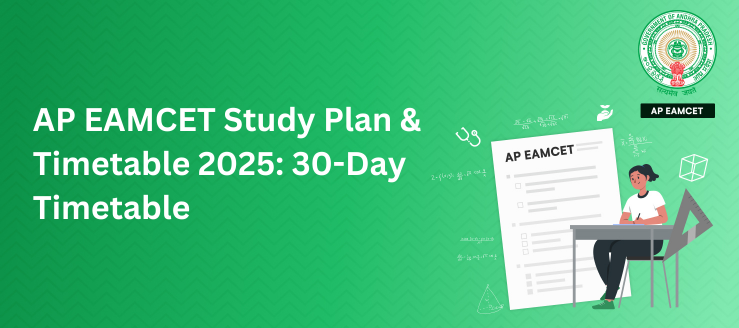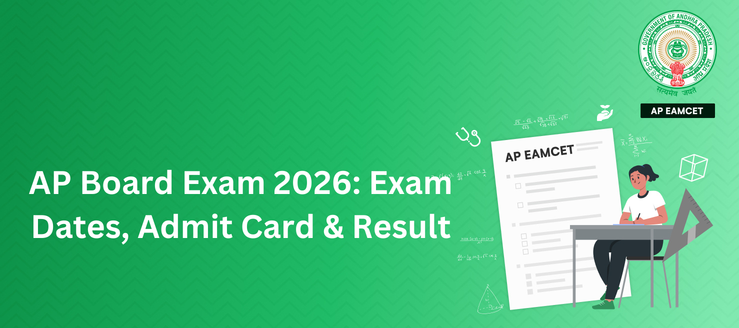Summarise With AI

AP EAMCET Study Plan 2025: The examination authorities scheduled the AP EAPCET 2025 examination from the 16th to the 22nd of May 2025. This test is a gateway for admission into different undergraduate courses in the fields of Engineering, Agriculture, and Pharmacy across Andhra Pradesh. Due to the high competition, the students have to plan the syllabus and schedule properly to achieve a good score in the AP EAPCET 2025 exam. The candidates can check the AP EAMCET 2025 Study Plan and Timetable here.
The Andhra Pradesh Engineering, Agriculture, and Pharmacy Common Entrance Test (AP EAPCET) is a state-level entrance test conducted by the Jawaharlal Nehru Technological University (JNTU), Kakinada, on behalf of the Andhra Pradesh State Council of Higher Education (APSCHE) once a year.
AP EAMCET Study Plan
To achieve a good score in the AP EAPCET 2025, the candidates may follow the important study tips:
1. Know the AP EAPCET 2025 Syllabus: The candidates should start the AP EAPCET 2025 preparation by knowing the entire syllabus. The candidates must know what topics are covered in the AP EAPCET syllabus. This will help to plan their study schedules accordingly.
The candidates must be familiar with the entire syllabus of Class 11 and 12.
2. Familiar with your Strengths and Weaknesses: The Candidates must start evaluating their strengths and weaknesses in each subject at the initial phase of their exam preparation. It’s important to find the areas that need improvement. This self-analysis will help the candidate to clarify the doubts at the beginning of the preparation.
3. Check Previous Year Question Papers: Practicing the Previous Year’s Question papers is the best way for the students to understand the examination pattern, Syllabus, Weightage, and the difficulty level of the questions.
The candidates can expect the same examination pattern in the AP EAPCET 2025 exam. They can understand the topic-wise weightage and level of difficulty of the questions. They can calculate the time required for each section in every subject and prepare to manage time. By practicing the PYQs the students can attempt the test in a better and confident way.
4. Regular Practice: The candidates should make sure to revise their notes and study materials regularly. This will help them to remember the topics in a better way.
5. Take Mock Tests: Include Mock Tests in your study Plan to understand your knowledge and to get familiar with the pattern, and time management.
Here are the Mock Test links:
| Engineering Stream | Click Here |
| Agriculture & Pharmacy Stream | Click Here |
Also Checkout: TS EAMCET Rank Predictor
6. Stay Healthy: Take good care of your health. Get the required amount of sleep. Eat proper food and set yourself up for the exam.
Also Check: AP EAMCET Previous Year Question papers
AP EAMCET 30-Day Timetable
The candidates can follow the below Timetable which is based on the Weight-age and covers every topic from the AP EAPCET Syllabus
Day | Topics to be Covered | ||
| Chemistry | Physics | Mathematics | |
| Day 1 | P – Block ElementsGroup 14 to 18 Elements | Laws of Motion | ALGEBRA 1. Functions 2. Mathematical Induction 3. Matrices 4. Sequence and series |
| Day 2 | 1. Some basic concepts in Chemistry 2. Atomic Structure | Work, Power, and Energy | VECTOR ALGEBRA 1. Addition of Vectors 2. Product of Vectors |
| Day 3 | 1. Chemical Bonding 2. Molecular Structure | System of Particles and Rotatory Motion | CALCULUS 1. Differentiation 2. Limis and Continuity 3. Differential Calculus |
| Day 4 | 1. Organic Chemistry – Some Basic Principles and Techniques 2. Redox Reactions | Mechanical Properties of Fluids | SETS AND FUNCTIONS 1. Sets 2. Relations and Functions 3. Trigonometric Functions |
| Day 5 | Classification of elements and periodicity in properties | Current Electricity | RELATIONS AND FUNCTIONS 1. Types of Relations and Functions 2. Binary Operations |
| Day 6 | Organic Compounds containing C, H, O | Moving Charges and Magnetism | APPLICATIONS OF DERIVATIVES 1. Rate of Change 2. Errors & Approximations |
| Day 7 | Organic Compounds Containing Nitrogen | Ray Optics and Optical Instruments | APPLICATIONS OF DERIVATIVES 1. Tangents & Normals 2. Mean Value Theorems 3. Maxima & Minima |
| Day 8 | 1. Chemical Equilibrium 2. Chemical Equilibrium – Acids, Bases, and Salts | Semiconductor Electronics – Materials, Devices, and Simple circuits | ALGEBRA 1. Complex Numbers 2. Quadratic Expressions |
| Day 9 | 1. Solutions 2. Solutions – Colligative Properties | Gravitation | ALGEBRA 1. Permutations and Combinations 2. Binomial Theorem |
| Day 10 | 1. Coordination Compounds 2. Chemical Thermodynamics | Motion in a Straight line | ALGEBRA 1. Measures of Dispersion 2. De Moivre’s Theorem |
| Day 11 | States of Matter – Liquids and Gases | Motion in a plane | ALGEBRA Theory of Equations |
| Day 12 | Chemistry in Everyday Life | Thermodynamics | COORDINATE GEOMETRY 1. Circle 2. System of Circles |
| Day 13 | 1. Biomolecules 2. Polymers | Thermal Properties of Matter | COORDINATE GEOMETRY 1. Parabola 2. Hyperbola |
| Day 14 | Purification and Characterisation of Organic Compounds | Electric Charges and fields | COORDINATE GEOMETRY 1. Ellipse 2. Plane |
| Day 15 | Organic Chemistry – Hydrocarbons | Electrostatic Potential and Capacitance | CALCULUS 1. Integration 2. Definite Integrals |
| Day 16 | 1. Environmental Chemistry 2. Surface Chemistry | Dual Nature of Radiation and Matter | CALCULUS 1. Differential Equations 2. Areas |
| Day 17 | d & f block elements | Nuclei Atoms | PROBABILITY 1. Probability 2. Random variables and probability distribution |
| Day 18 | s-block elements – Alkali and Alkaline earth metals | Communication Systems | COORDINATE GEOMETRY 1. Locus 2. Transformation of Axes |
| Day 19 | Hydrogen and its compounds | Alternating Current | COORDINATE GEOMETRY 1. The straight line 2. Pair of Straight lines |
| Day 20 | Chemical Kinetics | Electromagnetic Waves | COORDINATE GEOMETRY 1. Three-dimensional coordinates |
| Day 21 | General Principles and Processes of isolation of metals | Electromagnetic Induction | COORDINATE GEOMETRY 1. Direction Cosines 2. Direction Ratios |
| Day 22 | Stoichiometry | Waves | ALGEBRA 1. Partial Fractions |
| Day 23 | Solid State | Wave Optics | TRIGONOMETRY 1. Trigonometry 2. Trigonometric ratios up to transformations |
| Day 24 | P-block elements: Group 13 (Boron Family) | Magnetism and Matter | ALGEBRA 1. Determinants |
| Day 25 | P-block elements: Group 14 (Carbon Family) | Mechanical Properties of Solids | TRIGONOMETRY 1. Inverse Trigonometric functions |
| Day 26 | 1. Electro Chemistry 2. Electro Chemistry – Chemical Kinetics | Gravitation | TRIGONOMETRY 1. Hyperbolic Functions |
| Day 27 | 1. Haloalkanes 2. Haloarenes | Oscillations | TRIGONOMETRY 1. Properties of Triangles |
| Day 28 | General Principles of Metallurgy | Kinetic Theory of Gases | TRIGONOMETRY 1. Trigonometric Equations |
| Day 29 | Electrochemistry | Thermal properties of Matter | Trigonometric Functions |
| Day 30 | Chemical Bonding | 1. Physical World 2. Units and Measurements | Sequence and Series |
1. Where can I access the AP EAPCET 2025 Mock Tests?
The candidates can access the AP EAPCET 2025 mock tests through the mentioned here below:
– Engineering Stream: https://g01.digialm.com//OnlineAssessment/index.html?1480@@M54
– Agriculture & Pharmacy Stream: https://g01.digialm.com//OnlineAssessment/index.html?1480@@M53
2. Which subject should be given more preference when it comes to the AP EAPCET 2025 preparation?
Physics and Chemistry are the tough subjects in the AP EAPCET. Therefore, the students need to give equal attention to both subjects.







